How to Make Potting Soil for Blueberries – 4 Simple Steps
-
Codee Chessher
- Last updated:
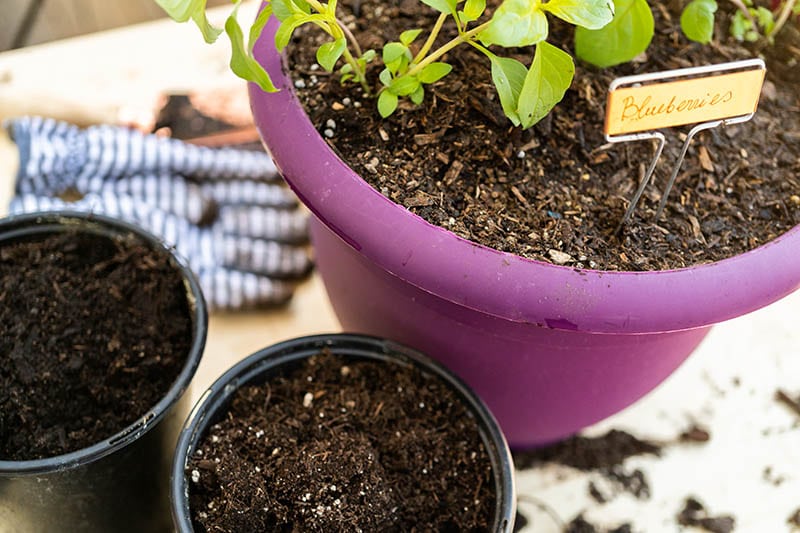
Blueberries are one of nature’s treasures, yielding delicious berries that are great eaten right off the bush or collected to craft culinary concoctions. Blueberry bushes aren’t high-maintenance plants, so long as you provide their preferred growing conditions. Sun and water are fairly straightforward, but what about the soil?
Today, we’ve gathered all the information you need to create your very own blueberry potting soil, which will give your bush the best start at life. Let’s wade in below with what you’ll need and how to go about it.
Before You Start
First, you need to educate yourself on the blueberry bush’s preferred soil conditions. This soil is made with potted blueberry bushes in mind, but it’ll work for bushes in the ground, too. Let’s briefly summarize them in a handy bulleted list down below.
Ideal Blueberry Soil Conditions:
- Acidic soil between 4.2–5.0 pH
- Prefers light, loamy soil
- Prefers organic matter mixed in with the soil
- Needs ample drainage due to shallow root system
Doesn’t seem too picky, right? Let’s see what you’ll need to satisfy these requirements with your homemade potting soil blend.
You Will Need:
- Commercial potting soil (base)
- Peat moss or coco coir
- Coarse sand
- Compost
- Perlite
- Shredded pine bark
These ingredients will help provide your blueberries with suitably acidic soil as well as all the nutrients and drainage it needs to stay healthy and grow big, juicy berries.
The 4 Steps to Make Potting Soil for Blueberries
1. Add Peat Moss or Coco Coir to Base Soil
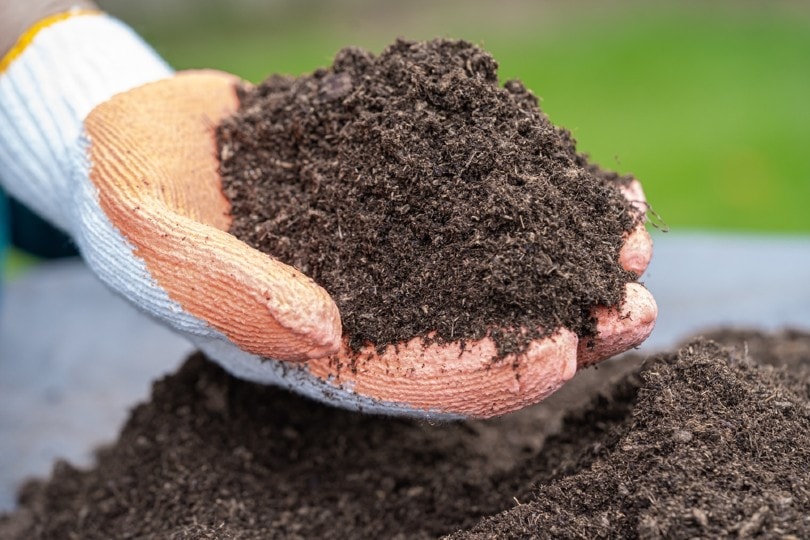
Using a bucket or large tub, add your desired potting mix base. A sterile commercial blend is preferable because it allows you to more precisely control the soil’s conditions, but native soil works in a pinch too.
Peat moss is generally better for blueberries because it provides nutrients while acidifying the soil, while coco coir breaks down more slowly but is pH neutral. If you’re starting with very acidic soil, coco coir may be more useful to not tamper with the delicate pH level. Otherwise, peat moss is better.
2. Add Compost for Nutrients & Soil Structure
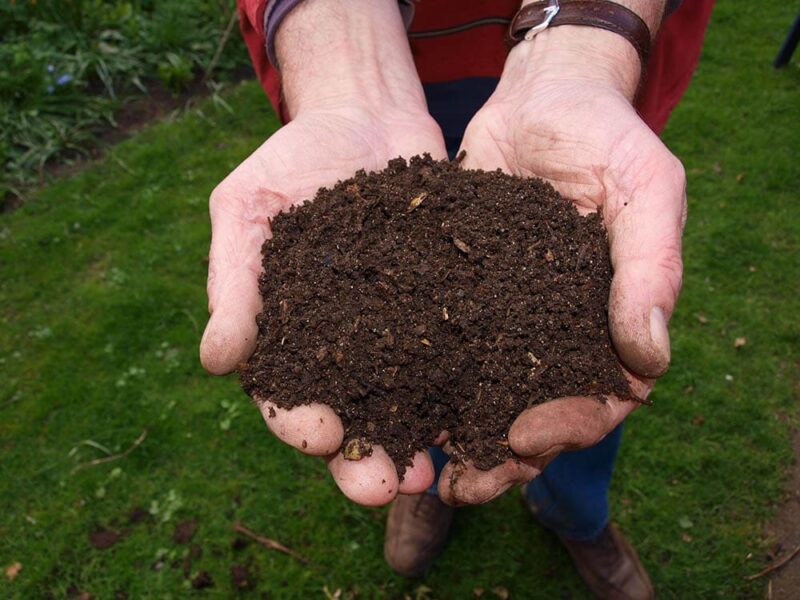
Compost is the black gold of any gardener’s treasure hoard, used to supercharge any soil with a slow release of nutrients. Not only that, but most composts have beneficial soil-dwellers like worms and mites, which help churn up soil and keep things loose and airy.
Compost also improves drainage and keeps water levels in the soil more stable as it decomposes. Even adding partially decomposed leaves to soil can do wonders for poor drainage. This extends to preventing soil compaction too, which is critical for heavier clay soil.
Finally, compost has been proven to increase fruit yield and quality, which is especially important for blueberries. Compost does this by providing organic materials to the soil and plant, drastically boosting the levels of beneficial biochemicals like antioxidants in fruit. There’s more to it, of course, but the point is that compost is really good for most plants.
3. Mix in Perlite & Coarse Sand for Drainage
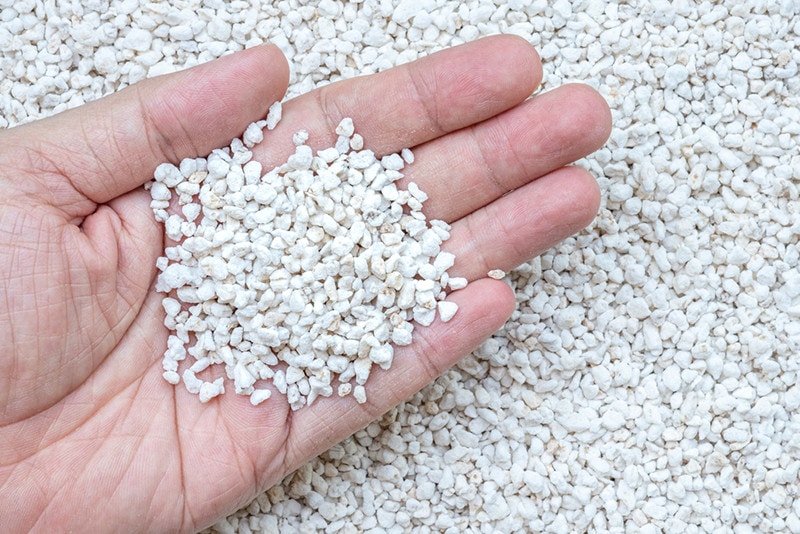
Perlite is the white Styrofoam-looking stuff in commercial soil blends, but it’s really a lightweight mineral found in nature. It’s a very airy, nonporous material that helps improve aeration in thick, compacted soil. This helps keep the soil nice and loamy without becoming too thick. Airy soil is important for keeping your blueberry bush’s roots moist but not saturated.
Coarse sand also serves an important role in soil drainage. Sand creates tiny air pockets in the soil that oxygen, water, and nutrients can use as pathways for your plant’s roots. The main downside of sand is that it doesn’t hold nutrients well, so it’s only useful for improving drainage. Using sand and perlite in your blueberry bush’s soil will help solve any drainage problems before they ever start.
4. Shredded Pine Bark Mulch Is the Cherry on Top
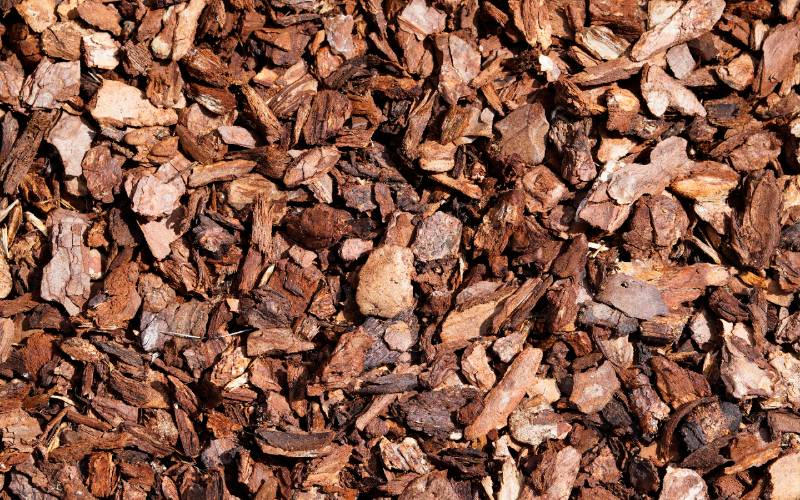
Shredded pine bark is the perfect mulch for blueberries, and many gardeners swear by it to keep their bushes nice and comfortable. Shredded pine and aged pine fines alike are great options, but the key is pine. Pinewood has the same acidic pH that blueberries prefer, and fines are even sterile if you don’t want to bother with weeding.
We recommend shredded pine because it keeps the soil airy while retaining the perfect amount of moisture and shielding the soil from direct sunlight. Pine bark also decomposes to release nutrients like potassium, phosphorus, aluminum, and more.
The main downside to be aware of is that pine bark leeches nitrogen from the soil as it decomposes. We already have peat moss and compost in the recipe to combat this, so you’re good to go!
Conclusion
If you want the biggest, juiciest blueberries you’ve ever seen, you need to start with the right soil. An acidic, lightweight mix rich with organic material and with amendments for drainage is the ultimate soil for your blueberries, so get mixing today!
Featured Image Credit: Arina P Habich, Shutterstock
Contents
